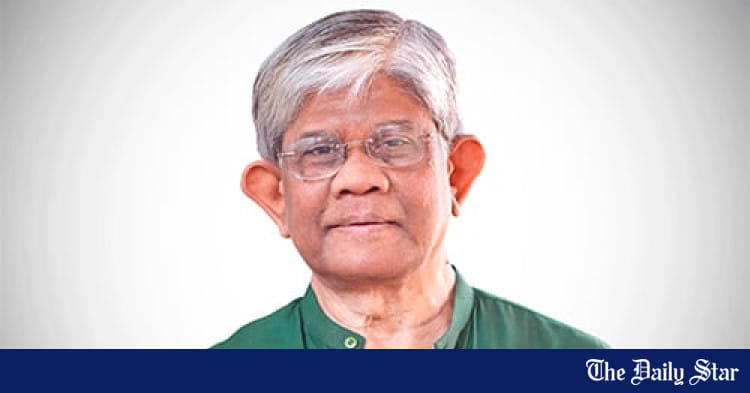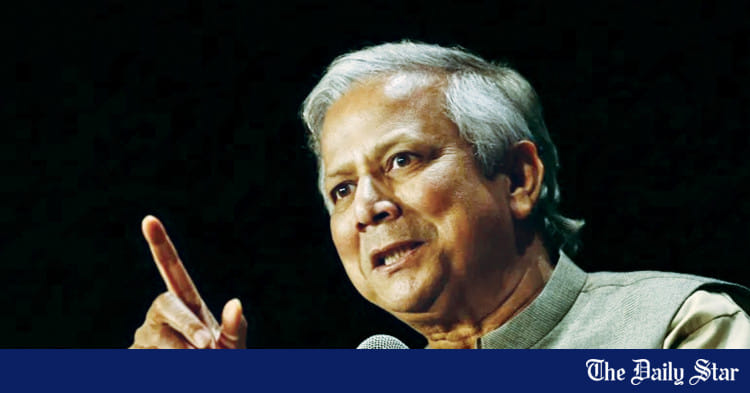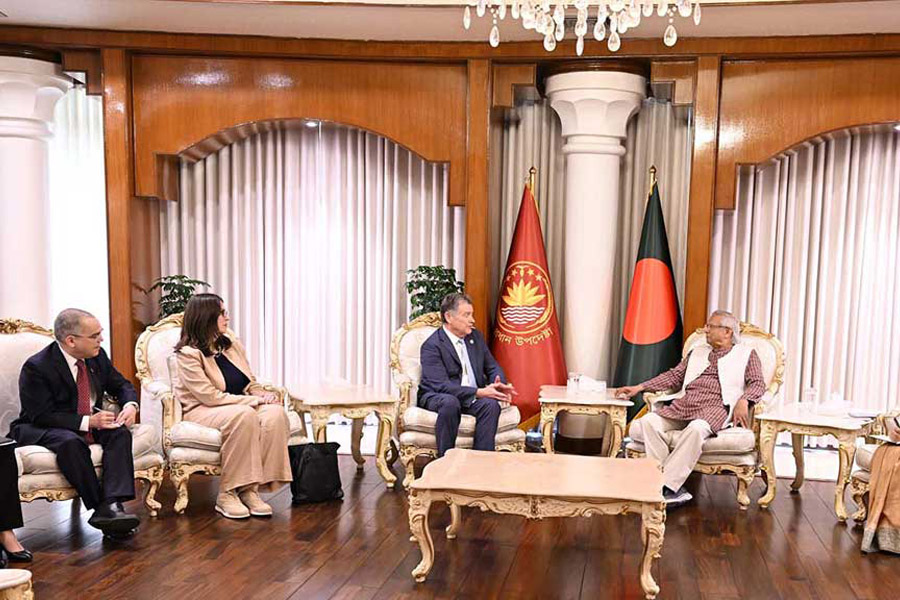Saif
Senior Member
- Messages
- 17,481
- Likes
- 8,438
- Nation

- Residence

- Axis Group


Chief Adviser considering resignation amid political tensions: Nahid
National Citizens' Party (NCP) Convener Nahid Islam met with Bangladesh’s Interim Government Chief Adviser Professor Dr. Muhammad Yunus on Thursday evening following reports that Yunus may step down from his position. The meeting took place at the state guest house, Jamuna, where the Chief A
Chief Adviser considering resignation amid political tensions: Nahid
FE ONLINE DESK
Published :
May 23, 2025 00:25
Updated :
May 23, 2025 00:25

National Citizens' Party (NCP) Convener Nahid Islam met with Bangladesh’s Interim Government Chief Adviser Professor Dr. Muhammad Yunus on Thursday evening following reports that Yunus may step down from his position.
The meeting took place at the state guest house, Jamuna, where the Chief Adviser currently resides.
Speaking to BBC Bangla, Nahid Islam confirmed the meeting, stating, “We’ve been hearing rumors since this morning about Sir’s possible resignation. I met him to discuss the situation.”
According to Nahid, Dr. Yunus expressed concerns over his ability to continue working under the current political climate. “He said, ‘You brought me in after a mass uprising for change and reform, but I feel like I’m being held hostage. How can I function like this?’” Nahid quoted the Chief Adviser as saying.
Nahid further urged Dr. Yunus not to resign and to remain firm in his leadership. “I told him that the hopes of the mass uprising, national security, and the country’s future depend on his leadership. He should stay strong and continue building unity among all parties.”
However, the NCP leader admitted that Dr. Yunus is seriously considering stepping down. “Yes, he said if he cannot work effectively, then what’s the point of staying?” Nahid told the BBC.
Dr. Yunus reportedly told Nahid that unless political parties show trust and provide assurance, continuing in his role may not be feasible.
Earlier today, the Bangladesh Nationalist Party (BNP) demanded the resignation or dismissal of two advisers and the National Security Adviser. The call came during ongoing protests demanding the swearing-in of BNP leader Ishraque Hossain as Mayor of Dhaka South City Corporation.
In a subsequent press conference, the BNP called for the removal of advisers Mahfuz Alam and Asif Mahmud, as well as National Security Adviser Khalilur Rahman.
In a counter-response, a senior leader of the NCP warned that unless reform recommendations are implemented, three other advisers—Law Adviser Prof. Asif Nazrul, Finance Adviser Salehuddin Ahmed, and Planning Adviser Dr. Wahiduddin Mahmud—may be forced to resign, labeling them as “BNP spokespersons.”
Meanwhile, Information Adviser Mahfuz Alam issued a Facebook post on Thursday apologizing for any divisive remarks or language used in the past.
As tensions mount within the interim administration, questions remain about the future leadership and direction of the transitional government in a politically polarized Bangladesh.
FE ONLINE DESK
Published :
May 23, 2025 00:25
Updated :
May 23, 2025 00:25
National Citizens' Party (NCP) Convener Nahid Islam met with Bangladesh’s Interim Government Chief Adviser Professor Dr. Muhammad Yunus on Thursday evening following reports that Yunus may step down from his position.
The meeting took place at the state guest house, Jamuna, where the Chief Adviser currently resides.
Speaking to BBC Bangla, Nahid Islam confirmed the meeting, stating, “We’ve been hearing rumors since this morning about Sir’s possible resignation. I met him to discuss the situation.”
According to Nahid, Dr. Yunus expressed concerns over his ability to continue working under the current political climate. “He said, ‘You brought me in after a mass uprising for change and reform, but I feel like I’m being held hostage. How can I function like this?’” Nahid quoted the Chief Adviser as saying.
Nahid further urged Dr. Yunus not to resign and to remain firm in his leadership. “I told him that the hopes of the mass uprising, national security, and the country’s future depend on his leadership. He should stay strong and continue building unity among all parties.”
However, the NCP leader admitted that Dr. Yunus is seriously considering stepping down. “Yes, he said if he cannot work effectively, then what’s the point of staying?” Nahid told the BBC.
Dr. Yunus reportedly told Nahid that unless political parties show trust and provide assurance, continuing in his role may not be feasible.
Earlier today, the Bangladesh Nationalist Party (BNP) demanded the resignation or dismissal of two advisers and the National Security Adviser. The call came during ongoing protests demanding the swearing-in of BNP leader Ishraque Hossain as Mayor of Dhaka South City Corporation.
In a subsequent press conference, the BNP called for the removal of advisers Mahfuz Alam and Asif Mahmud, as well as National Security Adviser Khalilur Rahman.
In a counter-response, a senior leader of the NCP warned that unless reform recommendations are implemented, three other advisers—Law Adviser Prof. Asif Nazrul, Finance Adviser Salehuddin Ahmed, and Planning Adviser Dr. Wahiduddin Mahmud—may be forced to resign, labeling them as “BNP spokespersons.”
Meanwhile, Information Adviser Mahfuz Alam issued a Facebook post on Thursday apologizing for any divisive remarks or language used in the past.
As tensions mount within the interim administration, questions remain about the future leadership and direction of the transitional government in a politically polarized Bangladesh.







